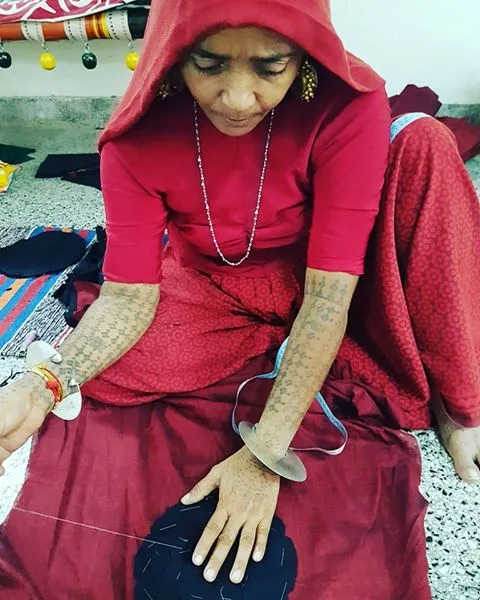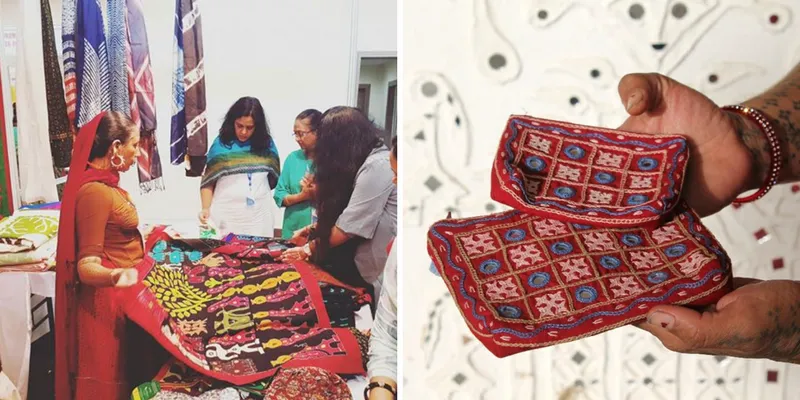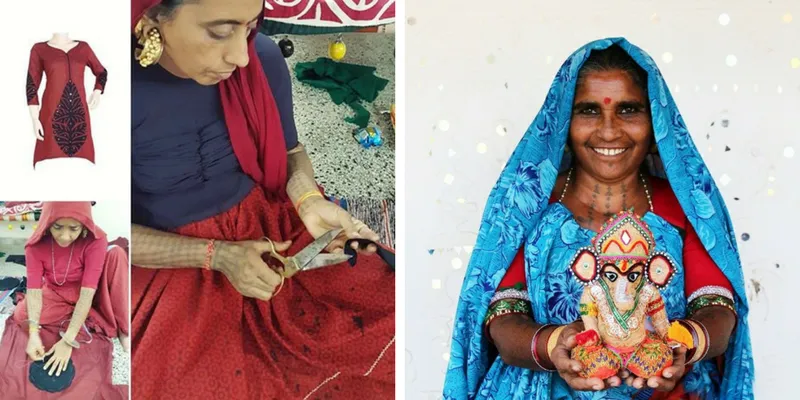This artisan-led apparel and accessories brand is providing employment to 500 Gujarati women
Since 1996, Okhai has been supporting local women artisans in the villages of Mithapur district in Gujarat by training them in the crafts of appliqué and embroidery.

In the Okhamandal region of Gujarat, Tata Chemicals Society for Rural Development (TCSRD) is giving employment and hope to hundreds of women. The Okhamandal region, primarily a drought-ridden area where the local people are mostly dependent on agriculture for their sustenance, is now finding a new source of livelihood in the form women entrepreneurs.
This is the story of Okhai, an e-commerce portal that offers handcrafted apparel and lifestyle products created by rural artisans from across India.
Bringing out local talent
What began as a small self-help group with a bunch of women from the Rabari tribe of the Mithapur district is now an apparel enterprise run by hundreds of local women of the region.
The locals were skilled at making handicrafts and clothes with different ornamental needlework, kathi designs, heer bharat, and beadwork. These women were supported by and brought together by TCSRD in 1996 under the name of Okhai.

Over the years, Okhai has been training the local women artisans in the crafts of appliqué and embroidery.
Artisans of Okhai specialise in appliqué work and embroidery. Their appliqué form is unique to this tribe and their mirror work technique is one of the sturdiest, says Kirti Poonia, who runs the initiative.
The women of Okhai make these products from the comfort of their homes, giving them the opportunity to take care of their families and attend to their daily activities. These women are organised into groups of 20, under the leadership of one woman who coordinates and leads them. Each group is given a design template along with kits containing raw material and the needed paraphernalia.
Each group follows the template and delivers the product to the team leader, who further passes it on to the design team located in Ahmedabad. Here, artists from prominent design schools come up with varying designs for these women every few weeks.
Empowering women
Okhai is an enterprise of 500 women who handcraft contemporary designs by using the traditional method of artwork that is indigenous to the tribes of Mithapur. As a brand, Okhai Handicrafts constitutes ladies’ wear, men’s wear, home décor products, and accessories. Okhai products use mirror work, patchwork, and embroidery created as a vibrant expression of the rural way of life, their rituals, and their legends.

Okhai’s mission is to empower the women of these tribal areas and encourage women from less privileged backgrounds to acquire new skills; to give them the self-confidence and self-esteem required to earn by their own industry and initiative; and to enable them to carry this newly discovered skill and confidence into the wider world.
The organisation has been making significant contributions towards generating livelihood for hundreds of rural artisans. They have contributed to improving the lives of the women artisans which, in turn, has helped improve their economic as well as social status.
Okhai’s women artisans are now travelling out of their villages, they have the respect of their community, they are educating both sons and daughters, some have built concrete homes. When a woman brings money home, she buys the power to make family decisions and you can see that happening at Okhai — the artisans often tell me that they used to take money from their husbands, now they give money, says Kirti.
Way forward
In 2002, Alka Talwar, then TCSRD’s CSR head felt there needed to be a greater focus on the initiative, which was why in 2008, the organisation set up a public charitable trust called Okhai Centre for Empowerment which would focus on uplifting women by providing them with livelihood opportunities.

“We saw potential in their craft, the desire for empowerment, and the willingness to work for it and knew that we had to provide them with a platform,” says Alka. Today, Okhai conducts training programmes in crafts, and awareness programmes for understanding of quality, colour theory, and contemporary designs.”
One of the biggest problems in the handmade industry is that the value chain is not sustainable; the profit margins are hardly evenly distributed. By making and selling on our own on our website, we have evolved from an NGO making products to an e-commerce fashion brand by the artisans themselves, says Kirti.
"For many initial years the focus was on training and that’s why today our foundation is strong and our quality gives us the confidence to compete in the very competitive apparel industry,” she adds.
Currently, most of Okhai’s sales are online on its own website, but it also has outlets in Mithapur, where the products are made, and in Ahmedabad and Jamshedpur.
Enter the SocialStory Photography contest and show us how people are changing the world! Win prize money worth Rs 1 lakh and more. Click here for details!







